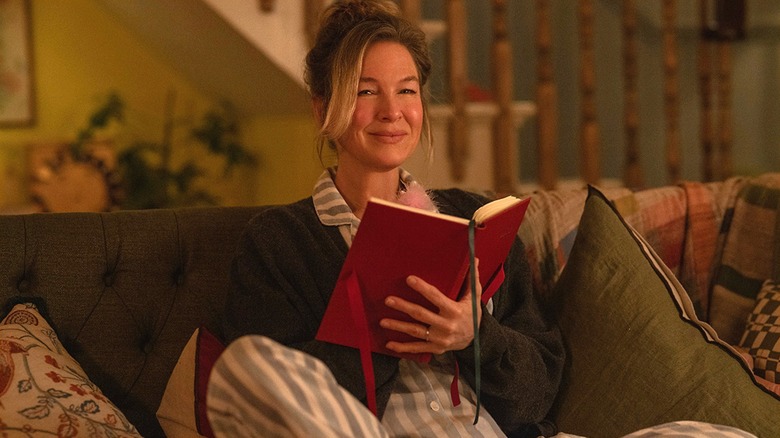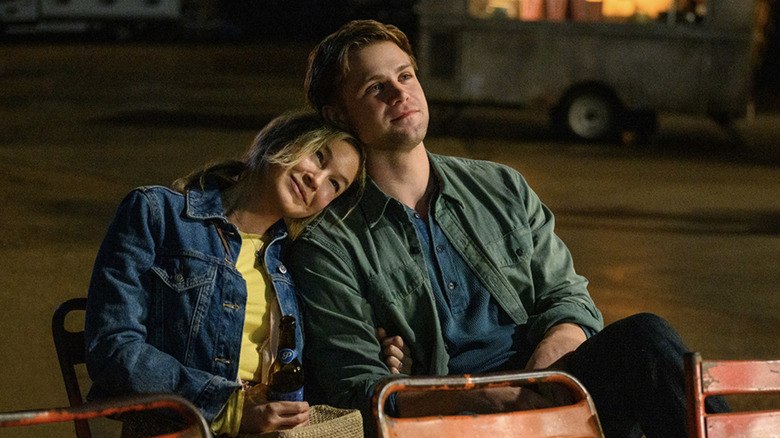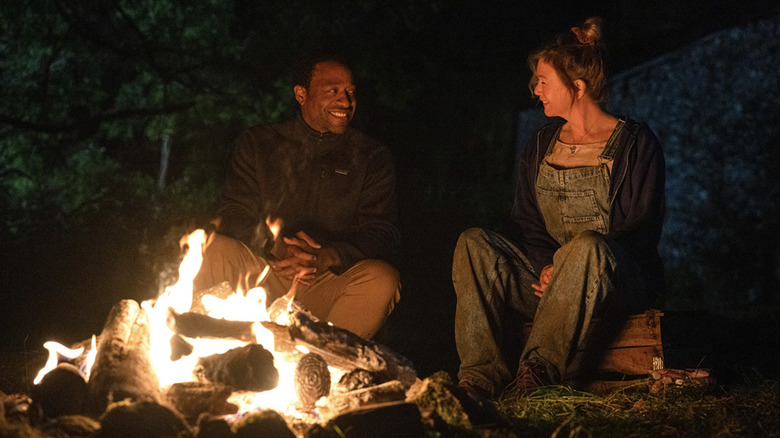Bridget Jones: Mad About The Boy Review - The Best Diary Entry Yet
- Bridget Jones finally feels like an authentic, relatable character
- Genuinely, surprisingly moving
- Earns every romcom cliché
- A little too long; the third act seems endless at times
What happens to romcom characters after their clichéd love stories come to an end, and they must adapt to reality with the partner of their dreams? In its fourth — and by far, best — outing, the "Bridget Jones" series manages to thread the needle between escapist romantic fantasy and earnest exploration of the realities of the life that follows what should have been a happily ever after.
Nobody comes to a "Bridget Jones" movie for realism, but "Bridget Jones: Mad About the Boy" understands what its predecessors struggled to, recognizing that even the most far-fetched of genre tropes becomes more palatable when pitched as cathartic to its protagonist, and the audience more generally. If Renée Zellweger's lead previously stretched credulity as a love interest to the most glamorous leading men — largely because the series has done Bridget dirty over the years, characterizing her anywhere between forgettably normal at best and unappealingly ditzy at worst — this time, the film around her keeps its feet on the ground. Her relationships remain the stuff of romcom fantasy, but as the story effectively renders her an emotionally downtrodden everywoman better than any prior installment from the moment of her introduction, it's far easier to surrender yourself to the movie magic.
Bridget gets better with age
We begin at the fourth anniversary of Bridget's husband, Mark Darcy's (Colin Firth), death. Trying to appear content as a single mother while the world passes her by, Bridget finally takes the advice of friends to go back to work and rejoin the dating world; after joining Tinder she becomes acquainted with younger man, Roxster (Leo Woodall), while her responsibilities as a mother keep her permanently in the orbit of her children's stern teacher Mr. Wallaker (Chiwetel Ejiofor). Luckily, the film avoids structuring this as another love triangle — and even better, largely refrains from age gap discourse until it can't be avoided any longer.
The character of Bridget Jones makes more sense the older she gets. Introduced in 2001's "Bridget Jones's Diary," a quasi-postmodern take on Jane Austen, she felt like something of an outdated trope — doing a modern riff on "Pride and Prejudice" loses its impact if you don't adapt to the times and accept that women in their early 30s can be happily single. 2004's "Bridget Jones: The Edge of Reason" lost goodwill due to the comedy sequel necessity to go bigger, reimagining Bridget as less relatable, more socially awkward, and more directly infantile, the character losing claim to any suggestion of being an everywoman as the writers heightened a clumsy persona beyond parody. When she returned over a decade later in "Bridget Jones's Baby," a team of new screenwriters — including Emma Thompson — moved with the times, finding plenty of obvious laughs in a "Mamma Mia" adjacent high-concept, but also taking seriously the idea of a single woman in her 40s wanting to be a mother. We're almost a further decade removed from that effort, but in retrospect, it now feels like the trial run for what "Bridget Jones: Mad About the Boy" achieves, aiming to explore female anxieties in middle age, alleviating any harsh truth with well-deserved escapism. The movie earns its euphoric, far-fetched highs because it does a good enough job making you find a palatable reality in its heroine's lows.
A not-inconsiderable factor in the film's success lies in how it re-contextualizes many of its returning characters, such as Hugh Grant's playboy Daniel Cleaver — who the film elegantly opts to overlook has returned from the dead in the most unlikely of circumstances. We're living in a golden age of Grant having fun subverting his movie star persona, weaponizing his innate charm to play villains both comic ("Paddington 2") and genuinely menacing ("Heretic"), but it's arguably bolder to see him take a similar approach while remaining rooted in his romantic comedy comfort zone. He only appears in, at most, six scenes, and yet Grant makes you feel the weight of his character's downfall in the years since he last appeared onscreen — a serial womanizer whose stubborn refusal to grow up has now made him the dirty old man lurking in the corner of every party. The actor refrains from making him a more simplistic caricature, attempting to find genuine pathos in the idea of a man-child who has refused to grow up, clinging onto memories of his glory days so much he hasn't even bought himself a new cellphone in 20 years.
There's tragedy beneath the romance
Helen Fielding's source novel "Bridget Jones: Mad About the Boy" was published in 2013 as the third Bridget Jones book, making headlines in Britain for the unexpected reveal that her lawyer love interest Mark Darcy was killed by a landmine in Sudan shortly after their happily ever after. The film follows the broad beats of that tale, but with less of a comic irreverence; Fielding's own husband died of cancer in the years following its publication, and this adaptation (which she co-wrote the screenplay for) aims to explore her semi-autobiographical character's grief with the weight it now deserves. Much of the first act follows Bridget's stasis as she arrives at the fourth anniversary of her husband's death, comfortably settled into life as a single mother of two, refusing to return to either work or the dating pool — she doesn't appear to be unable to move on, so much as she's just resigned herself to a permanent feeling that her life is incomplete.
Director Michael Morris, best known for several episodes of "Better Call Saul" and Andrea Riseborough's unlikely Oscar vehicle "To Leslie," doesn't sound like a logical fit for this material on paper, but proves to be as adept at finding a humanist melancholy beneath the genre artifice with a romcom as he was with a legal thriller featuring the Cartel. It doesn't use any groundbreaking visual motifs — Morris understands the popcorn demands of his audience — but through montage and spectral dream sequences, the film effectively conveys the mental state of a woman letting her life pass her by. It grounds the drama enough that, when Bridget is faced with two younger, hunkier prospective partners not-so-subtly designed to mirror the other two sides of her original love triangle, you feel yourself rooting for these fairytale romances which feel too good to be true. But for every moment that feels like wine mom wish fulfillment — such as a shirtless Leo Goodall climbing out of a pool, after saving a puppy no less, to kiss Bridget in front of a stunned crowd — there are several that don't want to get too lost in the fantasy. The pair's first sex scene is the rare one in this franchise to be played straight, recognizing the sex life of a single mother — her children's toys still laid over the bed — must be juggled with her responsibilities. However, the film isn't reductive and doesn't make her choose one over the other; it's a cliché, but yes, Bridget can have it all.
Ultimately, the clearest sign of how well "Bridget Jones: Mad About the Boy" works is that it earns the right to utilize the most well-worn of genre tropes. It may be pure wine mom cinema, but it has enough of a melancholy aftertaste with each sip to counteract each fantastical high.
"Bridget Jones: Mad About the Boy" hits Peacock on February 13.


